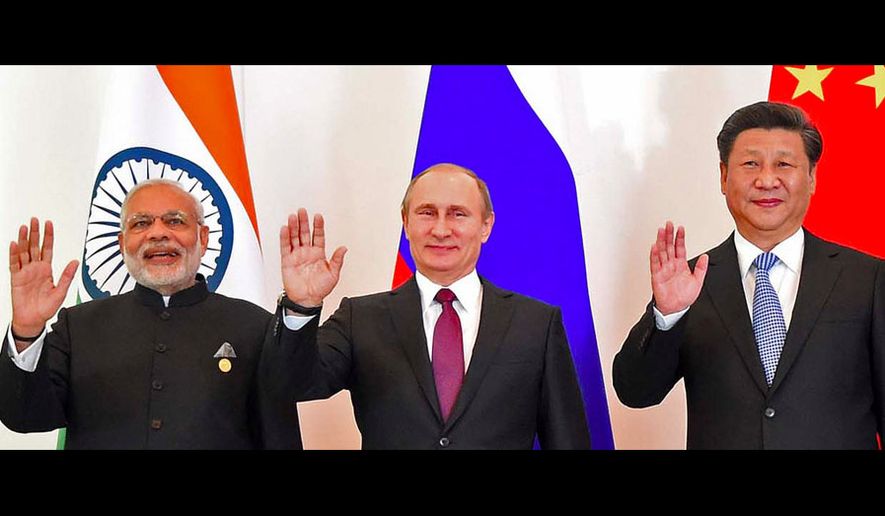OPINION:
In our previous statement in The Washington Times we advocated the formation of a new security group composed of the leaders of the top four nuclear, economic, and demographic powers. Its purpose would not be to replace but to back up the United Nations Security Council, which is visibly failing in its mission to maintain global peace and security.
Following the collapse of communism and dissolution of the USSR, there were some who predicted the arrival of the new world order under unquestioned US global leadership. The “end of history” as universal liberal democracy beckoned.
This is not what actually happened. The world today is not more but less safe than it was in 1991 when the red flags over the Kremlin came down. Talk of a World War III, once unthinkable, is becoming more and more frequent in political statements, the media, and among ordinary people.
Not only that, there’s increasing concern that it’s a war the US might not win. “US military superiority is no longer assured and the implications for American interests and American security are severe,” said a new report by the National Defense Strategy Commission, an independent agency authorized by Congress. The US “might struggle to win, or perhaps lose, a war against China or Russia.”
That’s even supposing there can be any winner in such a war, which inevitably would be nuclear. Ronald Reagan was right when he said, “A nuclear war cannot be won and must never be fought.”
This is why, on the eve of the Buenos Aires G20, we called upon US President Donald Trump to propose an early joint summit meeting with Russian President Vladimir Putin, Chinese President Xi Jinping, and Indian Prime Minister Narendra Modi in a format we called “USRIC” (United States, Russia, India, China). As it happened, not only did Trump ignore our appeal but moreover, he even cancelled the scheduled and long-anticipated bilateral meeting with Putin.
Sadly, another chance to find a way out of the mega-crisis in relations between the two nuclear superpowers was missed and no one knows how many more such chances we can expect.
Trump recently tweeted that he wants to talk with Russia and China after all about avoiding a costly arms race he calls “crazy” – which it is. Instead, the very next day his Secretary of State, Mike Pompeo, issued an ultimatum to Moscow that assures a new arms race with Russia. Maybe he didn’t see his boss’s tweet.
Pompeo also provided a laundry list of Russia’s misdeeds, or in his words “infamous acts,” including Georgia, Ukraine, Syria, election meddling, Skripal, the Kerch Strait, to name just a few. The Russians argue the validity of each accusation and put forward their own list of American “mistakes”: Serbia, Iraq, Libya, Syria, Yemen, Ukraine, and yes, election meddling in Russia and many other countries which no one disputes even in Washington.
This is now America’s choice: to continue the exchange of accusations while inching towards military, perhaps even nuclear, conflict or to try to develop the late President George H.W. Bush’s security configuration “from Vancouver to Vladivostok” – and extending it to Beijing and New Delhi.
At this time it looks like the Russian, Chinese, and Indian leaders are interested in this idea, as shown by their G20 meeting at which they indicated their intention to meet on a regular basis.
Unfortunately, at this point we have “RIC” instead of “USRIC.” What should be the fourth chair, for the US, remains empty.
How is that good for America?
• Edward Lozansky is president of the American University in Moscow. He is the author of the book Operation Elbe, which describes joint US-Russia anti-terrorist efforts. Jim Jatras is a former U.S. diplomat and former foreign policy adviser to the Senate GOP leadership.




Please read our comment policy before commenting.